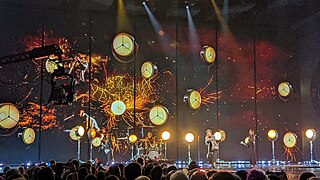Latvia in the Eurovision Song Contest
From Wikipedia, the free encyclopedia
Latvia has been represented at the Eurovision Song Contest 24 times since making its debut at the contest in 2000, where the song "My Star" performed by the group Brainstorm finished third. Latvia won the contest in 2002, with the song "I Wanna" by Marie N, defeating Malta by 12 points. Latvia is the second former Soviet country to win the contest. The 2003 contest was held in the Latvian capital Riga. The country achieved its third top 10 result in 2005, when "The War Is Not Over" by Walters and Kazha finished fifth. The Latvian participating broadcaster in the contest is Latvijas Televīzija (LTV), which select its entrant since 2015 with the national selection Supernova.
| Latvia in the Eurovision Song Contest | |
|---|---|
| Eurovision Song Contest | |

| |
| Participating broadcaster | Latvijas Televīzija (LTV) |
| Participation summary | |
| Appearances | 24 (11 finals) |
| First appearance | 2000 |
| Highest placement | 1st: 2002 |
| Host | 2003 |
| Related articles | |
| Supernova | |
| External links | |
| LTV page | |
| Latvia's page at Eurovision.tv | |
Latvia in the Eurovision Song Contest 2024 | |
Latvia did not participate in the final from 2009 to 2014, when they failed to qualify from the semi-finals for six consecutive years, including finishing last on three occasions, in 2009, 2010, and 2013.[1][2] Latvia qualified for the final for the first time since 2008 at the 2015 contest with the song "Love Injected" by Aminata. Its sixth place in the final is Latvia's fourth top 10 finish and best result in the contest since 2005. Latvia made its 10th appearance in the final in 2016. After failing to qualify for the final from 2017 to 2023, it finally managed to qualify to the final in the 2024 contest with "Hollow" by Dons.
Latvia has the distinction of having finished last in the Eurovision semi-finals more than any other country. Since its introduction in 2004, Latvia has finished last in five semi-finals, with "Probka" by Intars Busulis (2009), "What For?" by Aisha (2010), "Here We Go" by PeR (2013), "Line" by Triana Park (2017), and "The Moon Is Rising" by Samanta Tīna (2021).
Participation
Latvijas Televīzija (LTV) is a full member of the European Broadcasting Union (EBU) since 1 January 1993, thus eligible to participate in the Eurovision Song Contest since then. It has participated in the contest representing Latvia since its 45th edition in 2000.
LTV has chosen all its entrants in the contest through a national final, with the exception of "The Moon Is Rising" performed by Samanta Tīna in 2021.[a] Since 2015, the Latvian national selection is Supernova. Previously, the national selections were Eirodziesma (2000–2012) and Dziesma (2013–2014).
Participation overview
| 1 | First place |
| 2 | Second place |
| 3 | Third place |
| ◁ | Last place |
| X | Entry selected but did not compete |
| † | Upcoming event |
| Year | Artist | Song | Language | Final | Points | Semi | Points |
|---|---|---|---|---|---|---|---|
| 2000 | Brainstorm | "My Star" | English | 3 | 136 | No semi-finals | |
| 2001 | Arnis Mednis | "Too Much" | English | 18 | 16 | ||
| 2002 | Marie N | "I Wanna" | English | 1 | 176 | ||
| 2003 | F.L.Y. | "Hello from Mars" | English | 24 | 5 | ||
| 2004 | Fomins and Kleins | "Dziesma par laimi" | Latvian | Failed to qualify | 17 | 23 | |
| 2005 | Walters and Kazha | "The War Is Not Over" | English | 5 | 153 | 10 | 85 |
| 2006 | Vocal Group Cosmos | "I Hear Your Heart" | English | 16 | 30 | Top 11 in 2005 final[b] | |
| 2007 | Bonaparti.lv | "Questa notte" | Italian | 16 | 54 | 5 | 168 |
| 2008 | Pirates of the Sea | "Wolves of the Sea" | English | 12 | 83 | 6 | 86 |
| 2009 | Intars Busulis | "Probka" (Пробка) | Russian | Failed to qualify | 19 ◁ | 7 | |
| 2010 | Aisha | "What For?" | English | 17 ◁ | 11 | ||
| 2011 | Musiqq | "Angel in Disguise" | English | 17 | 25 | ||
| 2012 | Anmary | "Beautiful Song" | English | 16 | 17 | ||
| 2013 | PeR | "Here We Go" | English | 17 ◁ | 13 | ||
| 2014 | Aarzemnieki | "Cake to Bake" | English | 13 | 33 | ||
| 2015 | Aminata | "Love Injected" | English | 6 | 186 | 2 | 155 |
| 2016 | Justs | "Heartbeat" | English | 15 | 132 | 8 | 132 |
| 2017 | Triana Park | "Line" | English | Failed to qualify | 18 ◁ | 21 | |
| 2018 | Laura Rizzotto | "Funny Girl" | English | 12 | 106 | ||
| 2019 | Carousel | "That Night" | English | 15 | 50 | ||
| 2020 | Samanta Tīna | "Still Breathing" | English | Contest cancelled[c] X | |||
| 2021 | Samanta Tīna | "The Moon Is Rising" | English | Failed to qualify | 17 ◁ | 14 | |
| 2022 | Citi Zēni | "Eat Your Salad" | English | 14 | 55 | ||
| 2023 | Sudden Lights | "Aijā" | English, Latvian | 11 | 34 | ||
| 2024 | Dons | "Hollow" | English | 16 | 64 | 7 | 72 |
| 2025 | Tautumeitas | "Bur man laimi" | Latvian | Upcoming † | |||
Hostings
| Year | Location | Venue | Presenters |
|---|---|---|---|
| 2003 | Riga | Skonto Hall | Marija Naumova and Renārs Kaupers |
Related involvement
Summarize
Perspective
Heads of delegation
Each participating broadcaster in the Eurovision Song Contest assigns a head of delegation as the EBU's contact person and the leader of their delegation at the event. The delegation, whose size can greatly vary, includes a head of press, the contestants, songwriters, composers, and backing vocalists, among others.[3]
Commentators and spokespersons
| Year | Commentator | Spokesperson | Ref. |
|---|---|---|---|
| 1998 | Kārlis Streips | Did not participate | |
| 1999 | |||
| 2000 | Lauris Reiniks | ||
| 2001 | Renārs Kaupers | ||
| 2002 | Ēriks Niedra | ||
| 2003 | Ģirts Līcis | ||
| 2004 | Lauris Reiniks | ||
| 2005 | Marie N | ||
| 2006 | Mārtiņš Freimanis | ||
| 2007 | Janis Šipkevics | ||
| 2008 | Kristīne Virsnīte | ||
| 2009 | Roberto Meloni | ||
| 2010 | Kārlis Būmeisters | ||
| 2011 | Valters Frīdenbergs (all), Uģis Joksts (final) | Aisha | |
| 2012 | Valters Frīdenbergs (all), Kārlis Būmeisters (final) | Valters Frīdenbergs | |
| 2013 | Anmary | ||
| 2014 | Valters and Kaža | Ralfs Eilands | |
| 2015 | Valters Frīdenbergs (all), Toms Grēviņš (final) | Markus Riva | |
| 2016 | Toms Grēviņš | ||
| 2017 | Aminata Savadogo | ||
| 2018 | Toms Grēviņš (all), Magnuss Eriņš (final) | Dagmāra Legante | |
| 2019 | Toms Grēviņš (all), Ketija Šēnberga (final) | Laura Rizzotto | |
| 2021 | Toms Grēviņš (all), Marija Naumova (final) | Aminata Savadogo | |
| 2022 | Toms Grēviņš (all), Lauris Reiniks (final) | Samanta Tīna | |
| 2023 | Jānis Pētersons | ||
| 2024 | Andrejs Reinis Zitmanis |

- Karlis Streips is the first Latvian Eurovision commentator in history. He provided Eurovision Song Contest commentary until 2010
- Valters Frīdenbergs was lead commentator from 2011 until his illness in 2017 and death in 2018
- Toms Grēviņš has been lead Latvian commentator since 2018
Photo gallery
See also
- Latvia in the Junior Eurovision Song Contest – Junior version of the Eurovision Song Contest.
- Latvia in the Eurovision Young Dancers – A competition organised by the EBU for younger dancers aged between 16 and 21.
- Latvia in the Eurovision Young Musicians – A competition organised by the EBU for musicians aged 18 years and younger.
Notes
- Tīna won Supernova in 2020, but that year's Eurovision was cancelled due to the COVID-19 pandemic, and she was later internally selected to represent her country in the following year instead.
- According to the then-Eurovision rules, the top ten non-Big Four countries from the previous year along with the Big Four automatically qualified for the grand final without having to compete in semi-finals. For example, if Germany and France placed inside the top ten, the 11th and 12th spots were advanced to next year's grand final along with all countries ranked in the top ten.
- The 2020 contest was cancelled due to the COVID-19 pandemic.
References
Wikiwand - on
Seamless Wikipedia browsing. On steroids.
















